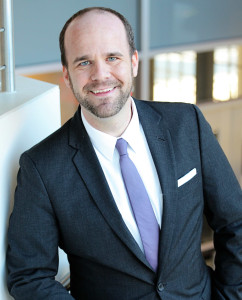“Every student comes to TCU with high potential. Who they meet, what they do, and how they think determines what we become.” That’s the philosophy of the Office of the First Year Experience at TCU, staff members in Student Affairs who work to connect new students to the people and resources they need to be successful inside and outside of the classroom. Researcher Vincent Tinto has built a career around studying characteristics, events, and experiences that help students to succeed in college and those that cause them to leave. In his 2012 Completing College: Rethinking Institutional Action, he moved the focus from the student to the institution saying, “Student success does not arise by chance. It requires that institutions commit themselves to intentional, structured, and systematic forms of action that involve faculty, student affairs staff, and administrators alike” (8). According to Tinto, those forms of actions fall into four areas: expectations, support, assessment and feedback, and involvement.
Expectations
Expectations are the way in which institutions communicate to students what they need to do to be successful not only in an overall course of study but also in a specific course. Students need to know as they walk through the door what TCU asks of them. Institutionally, we communicate this to new students through Orientation and Frog Camp, two programs intentionally designed to introduce students to the opportunities and expectations of TCU’s learning community. Faculty members can and should be setting high and clear expectations for students in the classroom. Other researchers have shown that the higher the expectations are for students, and the more engaged they must be in their coursework, the better they do overall in college (see Success in College by Kuh, et al. for more information). Encouraging high expectations is particularly important for students in their first year at TCU, because they’re making assumptions and drawing conclusions that will influence the next four years.
Support
Support is the extent to which students feel that TCU will help them live up to those expectations. As Tinto notes, “without academic, social, and in some cases financial support,
many students struggle to meet institutional expectations and succeed in college” (24). One of the classic theories undergirding the work of college education is Nevitt Sanford’s idea of the relationship between challenge and support. When students face too much challenge in their transition to college (be it academic, personal, or social) without an accompanying level of support, they feel overwhelmed and are unable to learn. When they receive a high level of support but are not challenged in their education they become complacent and do not learn. Growth and learning best occurs in a college environment where students encounter high (but appropriate) levels of both challenge and support. Faculty members can set these high challenge levels by setting high expectations. Levels of support come through accessible office hours, answering emails in a reasonable amount of time, and referring student concerns to the appropriate offices (for example, letting Campus Life know if a student has been missing class often or exhibits sudden changes in behavior).
Assessment and Feedback
Assessment and feedback communicate to students how well they are doing in meeting expectations. In order to be successful, students need frequent feedback from their faculty members so they can adjust their study habits and work levels accordingly. This is particularly important for first year students, who do not have a frame of reference for the level of work required to be successful in college compared to high school. Faculty members can help students to be successful by providing tests or making assignments due early in the semester—this lets students assess how they are progressing in a class while there is still time to make changes.
Involvement
Finally, students need involvement on the TCU campus, both inside and outside of the classroom. Numerous studies have shown the same result: the more students are involved on a campus (both academically and socially), the more deeply they’ll learn. They’re also more likely to graduate. In the classroom, this means giving students opportunities to be active participants in the learning process: group projects, in-class conversations, and engagement with research have all been shown to increase student learning. Out of the classroom, involvement with student organizations, in the residence halls, and in leadership opportunities do the same. A higher level of student involvement leads to a deeper the level of student learning.
Given these needs, the Office of the First Year Experience at TCU seeks to partner with faculty, staff, and upper-level students to provide support along each of those areas. We focus on eight areas of development that researchers like Upcraft, Gardner, and Barefoot have been shown to be crucial for a student’s first year:
- Establish and maintain interpersonal relationships
- Develop intellectual and academic competence
- Maintain health and wellness
- Consider faith and the spiritual dimensions of life
- Explore career opportunities
- Develop multicultural awareness
- Develop civic responsibility
- Explore identity development
In addition to working directly with first-year students, we are here to help faculty members deepen first-year student learning. If you would like more information on the needs of first-year students or TCU’s incoming class, please email us at fye@tcu.edu or visit our office in Student Development Services (BLUU 2003).
Work Cited and References
Braxton, J. M., et al. Rethinking College Student Retention. San Francisco: Jossey-Bass, 2014.
Kuh, G. D., et al. Student Success in College: Creating Conditions that Matter. San Francisco: Jossey-Bass, 2010.
Sanford, Nevitt. Where Colleges Fail: A Study of the Student as a Person. San Francisco: Jossey-Bass, 1967.
Tinto, Vincent. Completing College: Rethinking Institutional Action. Chicago: U of Chicago P, 2012.
Upcraft, M. Lee, John Gardner, and Betsy Barefoot. “Introduction: The First Year of College Revisited.” Challenging and Supporting the First-Year Student. Edited by Lee Upcraft, John Gardner, and Betsy Barefoot. San Francisco: Jossey-Bass, 1-12.



This article was written by John Mark Day, Lindsay Knight, and Trung Nguyen, Office of First Year Experiences at TCU, for the Spring 2015 Issue of Insights Magazine.